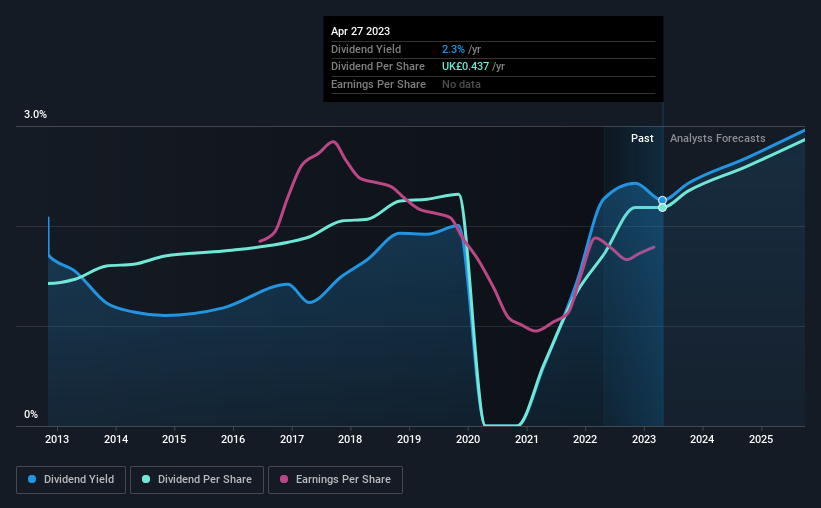- United Kingdom
- /
- Food
- /
- LSE:ABF
Associated British Foods' (LON:ABF) Shareholders Will Receive A Bigger Dividend Than Last Year

The board of Associated British Foods plc (LON:ABF) has announced that it will be increasing its dividend by 2.9% on the 7th of July to £0.142, up from last year's comparable payment of £0.138. Based on this payment, the dividend yield for the company will be 2.3%, which is fairly typical for the industry.
View our latest analysis for Associated British Foods
Associated British Foods' Dividend Is Well Covered By Earnings
While it is always good to see a solid dividend yield, we should also consider whether the payment is feasible. Prior to this announcement, Associated British Foods' earnings easily covered the dividend, but free cash flows were negative. No cash flows could definitely make returning cash to shareholders difficult, or at least mean the balance sheet will come under pressure.
Over the next year, EPS is forecast to expand by 74.2%. If the dividend continues on this path, the payout ratio could be 25% by next year, which we think can be pretty sustainable going forward.

Dividend Volatility
The company's dividend history has been marked by instability, with at least one cut in the last 10 years. Since 2013, the dividend has gone from £0.285 total annually to £0.437. This works out to be a compound annual growth rate (CAGR) of approximately 4.4% a year over that time. The dividend has seen some fluctuations in the past, so even though the dividend was raised this year, we should remember that it has been cut in the past.
Dividend Growth May Be Hard To Come By
With a relatively unstable dividend, it's even more important to evaluate if earnings per share is growing, which could point to a growing dividend in the future. In the last five years, Associated British Foods' earnings per share has shrunk at approximately 6.0% per annum. A modest decline in earnings isn't great, and it makes it quite unlikely that the dividend will grow in the future unless that trend can be reversed. It's not all bad news though, as the earnings are predicted to rise over the next 12 months - we would just be a bit cautious until this can turn into a longer term trend.
The Dividend Could Prove To Be Unreliable
Overall, this is probably not a great income stock, even though the dividend is being raised at the moment. While the low payout ratio is a redeeming feature, this is offset by the minimal cash to cover the payments. We don't think Associated British Foods is a great stock to add to your portfolio if income is your focus.
It's important to note that companies having a consistent dividend policy will generate greater investor confidence than those having an erratic one. However, there are other things to consider for investors when analysing stock performance. Taking the debate a bit further, we've identified 1 warning sign for Associated British Foods that investors need to be conscious of moving forward. If you are a dividend investor, you might also want to look at our curated list of high yield dividend stocks.
New: Manage All Your Stock Portfolios in One Place
We've created the ultimate portfolio companion for stock investors, and it's free.
• Connect an unlimited number of Portfolios and see your total in one currency
• Be alerted to new Warning Signs or Risks via email or mobile
• Track the Fair Value of your stocks
Have feedback on this article? Concerned about the content? Get in touch with us directly. Alternatively, email editorial-team (at) simplywallst.com.
This article by Simply Wall St is general in nature. We provide commentary based on historical data and analyst forecasts only using an unbiased methodology and our articles are not intended to be financial advice. It does not constitute a recommendation to buy or sell any stock, and does not take account of your objectives, or your financial situation. We aim to bring you long-term focused analysis driven by fundamental data. Note that our analysis may not factor in the latest price-sensitive company announcements or qualitative material. Simply Wall St has no position in any stocks mentioned.
About LSE:ABF
Associated British Foods
Operates as a diversified food, ingredients, and retail company worldwide.
Flawless balance sheet, undervalued and pays a dividend.

